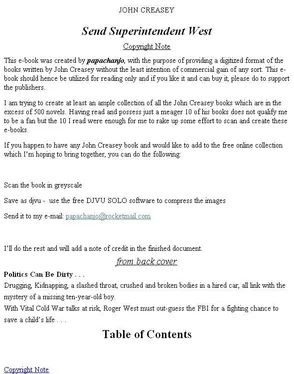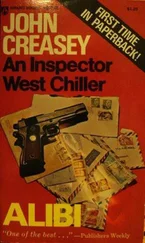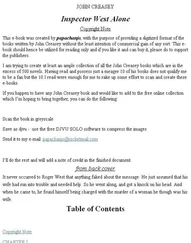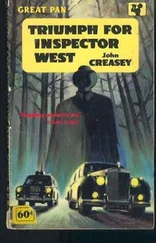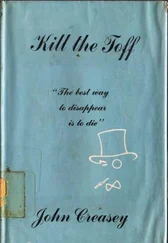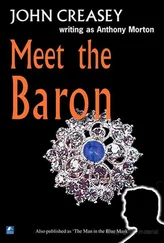John Creasey - Send Superintendent West
Здесь есть возможность читать онлайн «John Creasey - Send Superintendent West» весь текст электронной книги совершенно бесплатно (целиком полную версию без сокращений). В некоторых случаях можно слушать аудио, скачать через торрент в формате fb2 и присутствует краткое содержание. Жанр: Старинная литература, на русском языке. Описание произведения, (предисловие) а так же отзывы посетителей доступны на портале библиотеки ЛибКат.
- Название:Send Superintendent West
- Автор:
- Жанр:
- Год:неизвестен
- ISBN:нет данных
- Рейтинг книги:3 / 5. Голосов: 1
-
Избранное:Добавить в избранное
- Отзывы:
-
Ваша оценка:
- 60
- 1
- 2
- 3
- 4
- 5
Send Superintendent West: краткое содержание, описание и аннотация
Предлагаем к чтению аннотацию, описание, краткое содержание или предисловие (зависит от того, что написал сам автор книги «Send Superintendent West»). Если вы не нашли необходимую информацию о книге — напишите в комментариях, мы постараемся отыскать её.
Send Superintendent West — читать онлайн бесплатно полную книгу (весь текст) целиком
Ниже представлен текст книги, разбитый по страницам. Система сохранения места последней прочитанной страницы, позволяет с удобством читать онлайн бесплатно книгу «Send Superintendent West», без необходимости каждый раз заново искать на чём Вы остановились. Поставьте закладку, и сможете в любой момент перейти на страницу, на которой закончили чтение.
Интервал:
Закладка:
What would happen next?
Not light and darkness, for there was light in the room; he was recovering, and could see the wall — pictures on the wall, too. Silly pictures — that elephant, for instance. Who on earth would have a picture of an elephant, trunk curled upwards, as decoration? There were several other blurred shapes near it He stood up slowly and concentrated on them, and they began to make sense — an inverted kind of sense. A giraffe, long neck stretched full length; a snarling lion, a tiger, a bear. The Zoo. This was crazy. Who would decorate walls with —
His thoughts seemed to be cut off.
After a moment of numbed horror he accepted the answer to that last question. Parents would decorate walls with animals — for their children. In their childhood Richard and Martin had woven wonderful stories about the animal faces stuck on the walls of their nursery.
These murals ran along the full length of one wall, and he looked round, turned his head — and then stopped short Tension as great as that he had felt beneath the flashing light came back to him.
In the corner behind him was a bed, and on the bed lay a child.
• • •
The child was pale, about Ricky Shawn’s size, with the same thin features. Was it Ricky Shawn? Who else would it be? The child was thinner than Roger remembered him from the photograph, but his eyes were enormous — rounded, terrified as he lay on the pillows. His arms were over the sheets; there was a steel bracelet round each wrist, and the bracelets were fastened by slender steel chains to the bed, so that the boy couldn’t move. He couldn’t speak, either. Adhesive plaster smothered his lips, a pink smear where the mouth ought to be. His nostrils were moving spasmodically as he breathed, his chest was heaving. The terror in his eyes was an ugly thing.
Roger moistened his lips, and tried to speak. He only croaked. He smiled, and knew that he must look grotesque, was frightening the boy still more. How could he offer reassurance? He took a step forward, and the child cringed back. He stopped and touched the chair, then slowly turned it to face the boy, and sat down. He swallowed the lump in his throat, waited until his mouth was moist, and then spoke.
“I — won’t — hurt — you.”
The terror didn’t fade, and there was no change in the boy’s expression. Roger tried again, with the same words. It was no good. He doubted if the child heard him. He stood up, slowly, and repeated:
“I won’t hurt you.”
He went towards the small bed, and again the boy cringed back, but this time Roger went on until he was at the side of the bed. He smiled down, and this time his lips didn’t curl into grotesque lines; this time it was a more natural smile. He had to reassure the child; it wasn’t a question of trying, he had to do it. He put his right hand out and touched the boy’s forehead, smoothed it gently and smiled again. He didn’t think it did any good. The small forehead was cold as marble. Cold — and the room was warm.
I’ll try to help you,” Roger said. He couldn’t make a promise, one never made a promise to a child unless it could be kept I’ll try. Do you feel all right?”
The rounded eyes peered into his, still with no easing of the terror, no relaxing. The little arms, bare nearly to the elbow, were pale but taut Roger moved away, pulled the chair up and sat near the bed. There was no indication that the boy heard him, nothing had yet penetrated that cruel shell of terror.
“Listen to me,” Roger said slowly. “Nod if you can hear me. Nod your head if you can hear me.” He paused. “Can you hear me?”
He waited, feeling a surge of helplessness, and then won a slight reward. The boy nodded slowly, twice. Was it imagination, or was there at last a slight easing of the intensity of his fear?
“That’s good,” said Roger. “Nod if you understand me. I am going to try to get you away from here. Do you understand?”
A pause; then another nod.
“And a lot of people are trying to find you. Your mother and father — a lot of other people, too. Do you understand?”
A nod.
Roger said: Have they hurt you, Ricky?” He wanted to pull off the plaster, but before he started, he had to win the boy’s confidence. Even if he started, would he be allowed to finish? “Have they hurt you, Ricky?”
The door opened, the boy’s gaze switched and the terror flared up again. Roger turned as a man said:
“We haven’t hurt him, yet. We haven’t hurt you , yet. Get up and come with me.”
16
QUESTIONS
HE was a short man with broad shoulders, stocky, alert.
His dark hair was brushed off a forehead which hadn’t a wrinkle. His features were small in a big face — his mouth a puppet’s mouth. He wore only trousers and a shirt, and a tie that was pulled away from his neck, and looked fresh and cool. He didn’t show a gun, and the bigger man behind him in the doorway had empty hands.
The stocky man gripped Roger’s arm, waking the bruises to protest, but he didn’t resist — resistance wouldn’t get him anywhere. Not yet He didn’t look round at the child again. He was pushed to the right at the passage, and still in that powerful grip, hustled to the end of it and then through an open door. The passage wasn’t long, and there was ample room for two men to walk side by side.
Beyond the door a flight of wooden steps led downwards. He went down between the two men, turned right into a kitchen which glistened with white tiles and steel fittings, crossed a small room which had an arched doorway but no door, and then found himself in a long, narrow room, subdued lights, easy chairs, and all the furniture of a pleasant lounge, making it look homely and comfortable.
Sitting in an armchair at the far end of the room, legs stretched out, head resting against the back of the chair, was Gissing. And Gissing smiled at him.
There wasn’t any possibility of a mistake.
Here were the dark eyes, with almost hairless brows, and short, stunted lashes, the long, pale face and narrow, pointed chin, the small hooked nose and the thin gash of a mouth. Gissing was relaxed, smiling as if amused. This time he wore cotton gloves, and not adhesive plaster; he wasn’t going to leave fingerprints anywhere.
“Come and sit down, West,” he said.
The big man pushed Roger forward. He steadied himself against the side of a table, watching Gissing. An easy chair with its back to a draped window stood across the room, and he went across to it and sat down. He didn’t look round, but was sure that the men who had brought him from the boy’s room were still in the doorway. Then he forgot them. Gissing’s voice, so much more pleasant than his looks, was calm and amiable — he seemed genial, as if he were a world removed from the blinding lights and the captive child.
“Bring Mr West a drink, Mac.”
Mac for McMahon, who had taken a boy aboard an aircraft?
The stocky man with the big face and small features came forward; Roger hadn’t visualized him at a cocktail cabinet.
“Whisky and soda,” Gissing said. “You haven’t been here long enough to acquire new tastes, have you?”
“I’ve exactly the same likes and dislikes as always,” Roger said. He hoped his smile wasn’t too sickly.
Gissing chuckled.
“And you don’t like me! There’s no need to get hot about it, but you’re not a man to blow your top, are you? The drink is all right this time, although the one at the Milton Hotel wasn’t.”
So he hadn’t been brought here to be offered the poisoned cup. Gissing wanted to talk, to question him. Roger took the whisky and soda, and sipped. He could have emptied the glass in a gulp, and called for more, but resisted the impulse. He put it on a small table by his side, where a box of cigarettes and a lighter stood. He took a cigarette, lit it, and looked at Gissing.
Читать дальшеИнтервал:
Закладка:
Похожие книги на «Send Superintendent West»
Представляем Вашему вниманию похожие книги на «Send Superintendent West» списком для выбора. Мы отобрали схожую по названию и смыслу литературу в надежде предоставить читателям больше вариантов отыскать новые, интересные, ещё непрочитанные произведения.
Обсуждение, отзывы о книге «Send Superintendent West» и просто собственные мнения читателей. Оставьте ваши комментарии, напишите, что Вы думаете о произведении, его смысле или главных героях. Укажите что конкретно понравилось, а что нет, и почему Вы так считаете.
